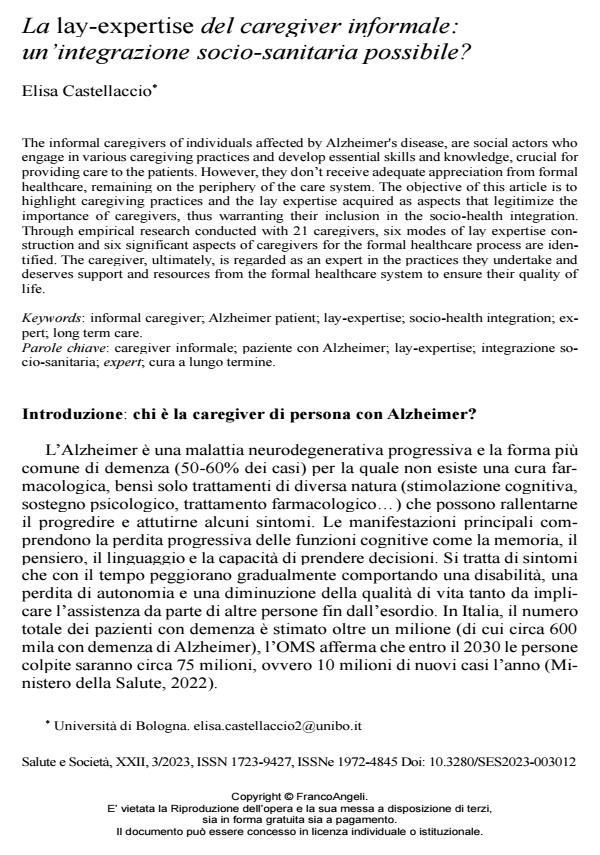La lay-expertise del caregiver informale: un’integrazione socio-sanitaria possibile?
Journal title SALUTE E SOCIETÀ
Author/s Elisa Castellaccio
Publishing Year 2023 Issue 2023/3 Language Italian
Pages 13 P. 164-176 File size 436 KB
DOI 10.3280/SES2023-003012
DOI is like a bar code for intellectual property: to have more infomation
click here
Below, you can see the article first page
If you want to buy this article in PDF format, you can do it, following the instructions to buy download credits

FrancoAngeli is member of Publishers International Linking Association, Inc (PILA), a not-for-profit association which run the CrossRef service enabling links to and from online scholarly content.
The informal caregivers of individuals affected by Alzheimer's disease, are social actors who engage in various caregiving practices and develop essential skills and knowledge, crucial for providing care to the patients. However, they don’t receive adequate appreciation from formal healthcare, remaining on the periphery of the care system. The objective of this article is to highlight caregiving practices and the lay expertise acquired as aspects that legitimize the im-portance of caregivers, thus warranting their inclusion in the socio-health integration. Through empirical research conducted with 21 caregivers, six modes of lay expertise construction and six significant aspects of caregivers for the formal healthcare process are identified. The care-giver, ultimately, is regarded as an expert in the practices they undertake and deserves support and resources from the formal healthcare system to ensure their quality of life.
Keywords: informal caregiver; Alzheimer patient; lay-expertise; socio-health integration; ex-pert; long term care.
- Strati A. (2004). L’analisi organizzativa: paradigmi e metodi. Roma: Carocci.
- Strauss A. (1985). Work and the Division of Labor. The Sociological Quarterly, 26(1): 1-19.
- Tognetti A. (2004). Le problematiche del caregiver. Gerontol, 52: 505-510.
- Twigg J. (2000). Carework as a form of body work. Ageing and society, 20: 389-411. DOI: 10.1017/S0144686X9900780
- Barnes M. (1997). Care, communities and citizens. Harlow: Addison Wesley.
- Bramboeck, V., Moeller, K., Marksteiner, J. et al. (2020). Loneliness and Burden Perceived by Family Caregivers of Patients With Alzheimer Disease. American journal of Alzheimer's disease and other dementias, 35, DOI: 10.1177/153331752091778
- Brown P. (1992). Popular Epidemiology and Toxic-waste Contamination: Lay and Professional Way of Knowing. Journal of Health and Social Behavior, 33(3): 267-281. DOI: 10.2307/213735
- Bury M. (1982). Chronic illness as biographical disruption. Sociology of Health and Illness, 4(2): 167-182.
- Callon M., Lascoumes P., Barthe Y. (2001). Agir dans un monde incertain. Essai sur la démocratie technique. La couleur des idées. DOI: 10.2307/332288
- Carlsson, G., Drew, N., Dahlberg et al. (2002). Uncovering tacit caring knowledge. Nursing Philosophy, 3(2): 144-51.
- Cherry M.G., Salmon P., Dickson J.M. et al. (2013). Factors influencing the resilience of carers of individuals with dementia. Reviews in Clinical Gerontology, 23: 251-266. DOI: 10.1017/S095925981300013
- Corbin J., Strauss A.L. (1985). Managing chronic illness at home: three lines of work. Qualitative sociology, 8(3): 224-247.
- Corradi G., Gherardi S., Verzelloni L. (2010). Through the practice lens: Where is the bandwagon of practice-based studies heading? Management Leaning, 41(3): 265-283. DOI: 10.1177/135050760935693
- Daga E., Corvo E., Marucci A., Sansoni J. (2014). L’esperienza dei caregiver primari che assistono a domicilio le persone affette dalla Malattia di Alzheimer. Professioni infermieristiche, 67 (1): 5-14.
- Epstein S. (1995). The Construction of Lay Expertise: AIDS Activism and the Forging of Credibility in the Reform of Clinical Trials. Science, Technology & Human Values, 20(4). DOI: 10.1177/01622439950200040
- Freidson E. (2001). Professionalism. The Third Logic. Chicago: The University of Chicago Press. (trad. it.: Professionalismo. La terza logica. Bari: Dedalo, 2002).
- Gherardi S. (2018). Practices and Knowledges. Teoria e Prática em Administração, 8(2), 33-59.
- Hancock P., Tyler M. (2000). “The Look of Love”: Gender and the Organization of Aesthetics. In: Hassard, J., Holliday, R., Willmott, H., a cura di, Body and Organization, London: Sage.
- Hochschild A.R. (1983). The managed heart: the commercialization of human feeling. Berkeley: University of California Press.
- Ingrosso M. (2021). L’integrazione sei servizi sociosanitari nelle comunità locali. In: Cardano M., Giarelli G., Vicarelli G., a cura di, Sociologia della salute e della medicina, Bologna: Il Mulino.
- Kontos P., Naglie G. (2009). Tacit knowledge of caring and embodied selfhood. Sociology of health & illness, 31(5): 688-704.
- Manghi S. (2005). Il medico, il paziente e l’altro. Un’indagine sull’interazione comunicativa nelle pratiche mediche. Milano: FrancoAngeli.
- Miele F. (2021). Anziani, salute e società. Politiche di welfare, discorso pubblico e cura quotidiana. Bologna: il Mulino.
- Ministero della Salute (2022). Dati epidemiologici. -- Testo disponibile al sito: https://www.salute.gov.it/portale/demenze/dettaglioContenutiDemenze.jsp?lingua=italiano&id=2402&area=demenze&menu=vuoto
- NNA (Network Non Autosufficienza) (2021). L’assistenza agli anziani non autosufficienti in Italia. 7 Rapporto 2020/2021. Punto di non ritorno. Fondazione Cenci Gallingani. Santarcangelo di Romagna: Maggioli Editore.
- Sadler E., McKevitt C. (2013). ‘Expert carers’: An emergent normative model of the caregiver. Social Theory & Health, 11, 40-58.
- Strati A. (1999). Organization and Aesthetics. Londra: Sage.
- Twigg J. (1989). Models of carers: How do social care agencies conceptualise their relationship with informal carers? Journal of Social Policy, 18(1): 53–66.
- Vellone E., Micci F., Sansoni, J. et al. (2000). Il vissuto esperienziale del familiare che si prende cura di una persona affetta da malattia d’Alzheimer. Sezione Studi e Ricerche, 67(1).
- Wynne B. (1996). Misunderstood Misunderstandings : Social Identities and the Public Uptake of Science. In: Irwin A., Wynne B., eds, Misunderstanding Science? The Public Reconstruction of Science and Technology. Cambridge: Cambridge University Press.
Elisa Castellaccio, La lay-expertise del caregiver informale: un’integrazione socio-sanitaria possibile? in "SALUTE E SOCIETÀ" 3/2023, pp 164-176, DOI: 10.3280/SES2023-003012